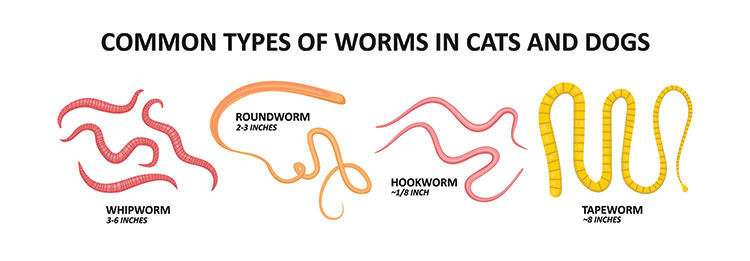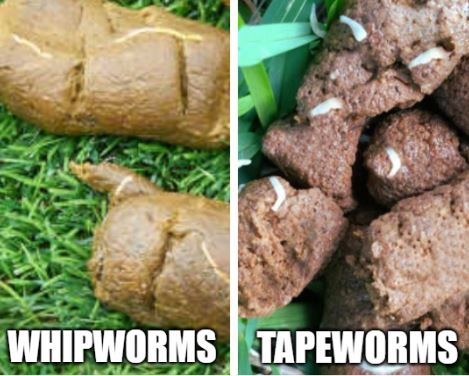
This article was updated on August 24th, 2023
It is common for dogs to have worms: some estimates suggest that up to 1 in 5 of every dog has internal parasites. For most, they are a minor inconvenience, and many have parasites without showing any signs at all.
However, there is the potential for worms to makes dogs very unwell. Puppies are at highest risk of death from worms and these pups usually have heavy worm burdens and will not have been treated with a de-wormer since born. Thankfully, this is something I rarely come across in practice, as most owners are now aware of the importance of de-worming their pets.
Overview of worm infestation in dogs
There are a range of intestinal worms that can affect our canine companions including whipworms, hookworms, tapeworms and roundworms.

As well as these intestinal worms, in certain parts of the world (including the USA, Eastern Europe and around the Mediterranean) we have to worry about heartworm too. The adult worms reside in the dog’s heart, lungs and blood vessels rather than in their gut.
Common types of worms in dogs & impact on a dog’s life expectancy
- Roundworms. Roundworms are shaped like spaghetti and are frequently seen, especially in pups. They can be transmitted from mum to pup when she is pregnant and when her litter are nursing. For most, these worms are relatively well tolerated, though heavy burdens can cause dehydration and failure to thrive in very young dogs. Very rarely, there are so many worms that they obstruct the gut and this can be fatal.

- Hookworms. These are nasty parasites with sharp teeth that attach onto the gut of the dog, sucking their blood. This can lead to blood loss and anemia. In young dogs with lots of hookworms, there is a chance of severe anemia that leads to circulatory shock and death. Although fatalities in puppies are possible, the prognosis is excellent as they are easily treated.

- Whipworms. Named due to their shape, these worms are skinnier at one end. They live in the cecum and large intestine so cause diarrhea that can contain blood and mucus. With very heavy burdens, dogs can become weak and debilitated and if dogs are very young or unwell for other reasons, this could potentially be fatal.

- Tapeworms. Tapeworms are renowned for consuming a dog’s calories, so they lose weight and develop a dull coat and lethargy. They can grow to be very large and dogs can pass visible segments in their stool. Tapeworms are not usually considered to be a threat to life. There is a potential risk of a gut obstruction, but this is not really seen in practice.
- Heartworms. Heartworms are far more dangerous than any intestinal worm. In fact, even in those treated aggressively, about 1 in 50 dogs will pass away. These parasites can cause heart failure and severe lung disease. Heartworm therapy is needed whenever a dog is diagnosed with heartworm but can be costly and dangerous; with some dogs passing away during treatment. Far better than treatment, is to keep your dog up to date with their prevention. Read our article about Life Expectancy After Heartworm Treatment.

How fast will worms kill a dog?
Thankfully, intestinal worms hardly ever pose a threat to a dog’s life. However, in very unwell dogs who have a lot of worms (particularly puppies) death can occur. It is not possible to put a time stamp on this, but once they are showing worrying signs such as food refusal, dehydration and weight loss, death could be just a few days away without treatment.
When it comes to heartworm, the story is different. This parasite poses a real threat to life, especially if dogs are not treated promptly. Dogs can pass just a few months after diagnosis.
Factors affecting the speed of worm-related fatality in dogs
- Type of worm. As discussed above, not all worms pose the same threat. A tapeworm can live for years inside a dog, and should not cause fatality. Heartworm, on the other hand, is a very dangerous parasite and can cause death in a matter of months.
- A dog’s age, size, and health Status. Intestinal worms pose a much greater threat to small puppies, who have little fat reserves and can become quickly dehydrated and anemic. Those pets who are already poorly will be much less capable of tolerating a worm infestation.
- Severity of infestation. For those with a small burden of intestinal worms, we may not see many obvious signs. However, symptoms will be apparent when lots of worms are present and we can even see complete gut obstructions.
What to do when my dog is infested with worms
Ideally, we would routinely give our dogs regular worm prevention, so the parasites do not have the chance to proliferate. For those who live in endemic areas, we have to be hot on the heartworm prevention.
If worms are suspected, we want to use a broad acting wormer ASAP.
If signs are persisting or worsening, a vet check would be needed and your vet can analyze your dog’s stool to determine if any parasites are present.
When to seek veterinary care & how it helps with recovery
If your dog is not unwell and just has mild symptoms (such as loose poo or mild bloating), we may be able to treat them for worms and find that they improve quickly.
However, if they are not improving or they start to develop more signs; such as pale gums, marked bloating, weight loss, panting, coughing, vomiting or ongoing diarrhea then it is important they are seen in person.
The vet can determine which (if any) parasites are present and provide the most appropriate therapy for your dog.
They can also provide supportive care such as IV fluids, probiotics and even a blood transfusion if needed.
If you have any suspicion your dog has heartworm or you realize their prevention is not in date, have them seen by their vet ASAP.
How can my veterinarian help and how much will it cost?
Your vet may suspect intestinal parasites based on their exam of the dog, and provide a wormer costing about $10-15. If they do run a stool analysis, this could cost from $25-50 if done in house, or more if sent externally.
More severe worm infestations that lead to the pet being hospitalized cost much more to treat; potentially hundreds or even thousands of dollars if the dog needs to be admitted for IV fluids and supportive feeding.
Treating heartworm is not cheap and will set an owner back anywhere from $800-$3,000. Treatment consists of a series of injections, antibiotics and strict rest. Steroids may also be given to prevent the risk of a reaction while the heartworm die.
Frequently Asked Questions
Are all types of worms equally dangerous to dogs?
No, they are not. Each worm causes its own effects on the body. Tapeworm is usually well tolerated, while hookworm can cause quite serious signs.
Can a dog recover without treatment?
Very mild intestinal worm infestations may go unnoticed and dogs remain well despite a lack of treatment. However, when worms are identified or start to cause signs, they should be treated. We would never leave a dog untreated as worm burden usually worsen and it is a risk to human health.
Can over-the-counter dewormers be effective?
Yes, many of them are. A great example is a broad acting wormer called Fenbendazole.
How long does it take for treatment to work?
Intestinal wormers get to work within just a few hours.
Related posts:
Disclaimer: This website's content is not a substitute for veterinary care. Always consult with your veterinarian for healthcare decisions. Read More.









Be the first to comment